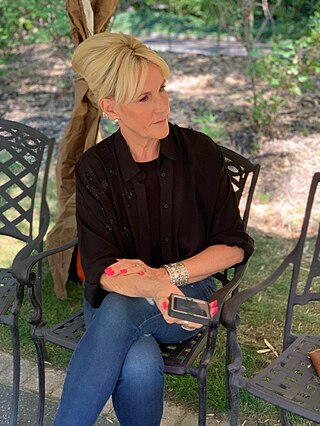
Erin Brockovich is an American paralegal, consumer advocate, and environmental activist who was instrumental in building a case against Pacific Gas & Electric Company (PG&E) involving groundwater contamination in Hinkley, California for attorney Ed Masry in 1993. Their successful lawsuit was the subject of the Oscar-winning film, Erin Brockovich (2000), starring Julia Roberts as Brockovich and Albert Finney as Masry.

The Rocky Flats Plant was a U.S. manufacturing complex that produced nuclear weapons parts in the western United States, near Denver, Colorado. The facility's primary mission was the fabrication of plutonium pits, which were shipped to other facilities to be assembled into nuclear weapons. Operated from 1952 to 1992, the complex was under the control of the U.S. Atomic Energy Commission (AEC), succeeded by the Department of Energy (DOE) in 1977.
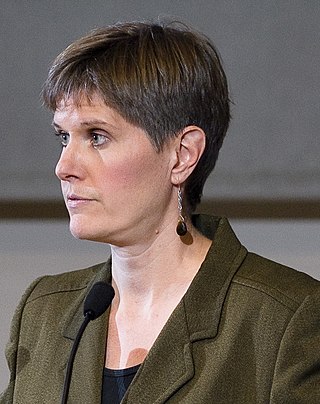
Sandra Steingraber is an American biologist, author, and cancer survivor. Steingraber writes and lectures on the environmental factors that contribute to reproductive health problems and environmental links to cancer.
Environmental justice or eco-justice, is a social movement to address environmental injustice, which occurs when poor or marginalized communities are harmed by hazardous waste, resource extraction, and other land uses from which they do not benefit. The movement has generated hundreds of studies showing that exposure to environmental harm is inequitably distributed.

Kathleen Hall Jamieson is an American professor of communication and the director of the Annenberg Public Policy Center at the University of Pennsylvania. She co-founded FactCheck.org, and she is an author, most recently of Cyberwar, in which she argues that Russia very likely helped Donald J. Trump become the U.S. President in 2016.

Breast Cancer Action (BCAction) is a U.S.-based grassroots education and activist organization driven by and supporting people living with breast cancer. It was founded in 1990 by Elenore Pred, Susan Claymon, Belle Shayer, and Linda Reyes. Based in San Francisco, BCAction is known for understanding breast cancer not as an individual crisis, but a public health emergency, and for their commitment to social justice. The organization's mission is to achieve health justice for all women at risk of and living with breast cancer. BCAction is known for its Think Before You Pink campaign, launched in 2002, which encourages consumers to ask critical questions before buying pink ribbon products and holds corporations accountable for pinkwashing.
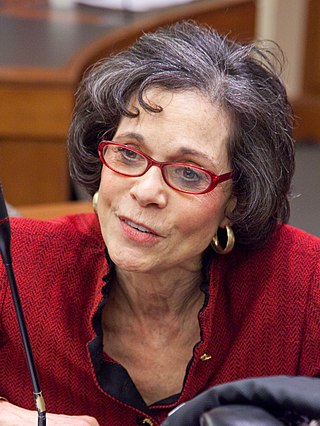
Devra Lee Davis is an American epidemiologist, toxicologist, and author of three books about environmental hazards. She was founding director of the Center for Environmental Oncology at the University of Pittsburgh Cancer Institute, and is a former professor of epidemiology at University of Pittsburgh Graduate School of Public Health. She has served on several governmental and non-governmental organizations, conducting research and advocacy into effects of pesticides, asbestos, and wireless radiation on human health, especially cancers.

Gary L. Kreps is a health and risk communication scholar. He is a Distinguished University Professor of communication at George Mason University in Fairfax, Virginia, United States, where he directs the Center for Health and Risk Communication. Kreps is one of the founding scholars of the field of health communication, having published several of the earliest seminal books and articles on the topic, worked to establish the Health Communication Divisions at both the International Communication Association (ICA) and the National Communication Association (NCA), helped to found the Society for Health Communication, and spurred the introduction of major health communication research programs, courses and curricula around the globe.

Breast Cancer Awareness Month (BCAM), also referred to in the United States as National Breast Cancer Awareness Month (NBCAM), is an annual international health campaign organized by major breast cancer charities every October to increase awareness of the disease and raise funds for research into its cause, prevention, diagnosis, treatment, and cure.
Dorothy Goldin Rosenberg is a Canadian educator and film consultant. She researches, writes and speaks on environmental health, equality, social justice, economic justice, environmental justice, peace, and energy issues.
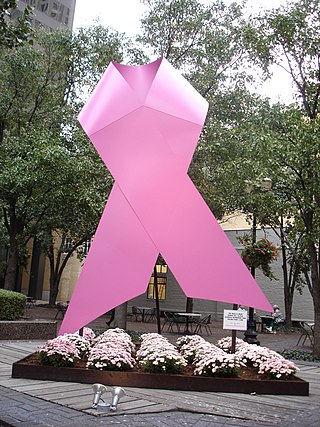
Breast cancer awareness is an effort to raise awareness and reduce the stigma of breast cancer through education about screening, symptoms, and treatment. Supporters hope that greater knowledge will lead to earlier detection of breast cancer, which is associated with higher long-term survival rates, and that money raised for breast cancer will produce a reliable, permanent cure.
Karen Ashcraft is an American communication scholar and professor at the University of Colorado at Boulder. Her area of research is in social justice and organizational studies. She looks at identity in the workplace and organizational structures. Specifically she studies issues of diversity, hybrid organizations, gender and power. Being an organizational communication scholar, she sees discourse as central to understanding our human condition as well as how communication amounts to organizing. She examines discourse through a lens of a feminist communicology model to look at the critical role that communication has in one's identity creation.
Marie Hochmuth Nichols (1908–1978) was an influential rhetorical critic.
Communities for a Better Environment (CBE), previously known as Citizens for a Better Environment, is a policy-focused non-profit organization started in 1971 by Marc Anderson and David Come in Chicago, Illinois. In the late 1970s and early 1980s, CBE expanded to California, Wisconsin, and Minnesota. CBE established itself in San Francisco in 1978 and expanded to Los Angeles in 1982. Today, CBE is based in Oakland, CA and Huntington Park, CA, effecting positive change in communities throughout California, including Richmond, East Oakland, Vernon, Huntington Park, Boyle Heights, Pacoima, Wilmington, and SE Los Angeles. CBE was the first environmental organization to practice door-to-door canvassing by directly involving community members. In 1980, CBE won the United States Supreme Court decision on Village of Schaumburg v. Citizens for a Better Environment 444 U.S. 620, protecting the 1st and 14th Amendment Rights of door-to-door activists with CBE and countless other public interest organizations. CBE's early combination of grassroots organizing with research and legal work provided the innovative edge needed to challenge large-scale industries and refineries, and government policies.
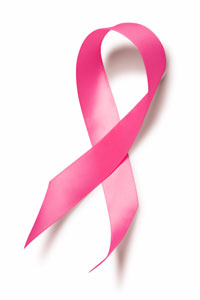
Pinkwashing is a form of cause marketing that uses a pink ribbon logos. The companies display the pink ribbon logo on products that are known to cause different types of cancer. The Pink ribbon logo symbolizes support for breast cancer-related charities or foundations.

Public rhetoric refers to discourse both within a group of people and between groups, often centering on the process by which individual or group discourse seeks membership in the larger public discourse. Public rhetoric can also involve rhetoric being used within the general populace to foster social change and encourage agency on behalf of the participants of public rhetoric. The collective discourse between rhetoricians and the general populace is one representation of public rhetoric. A new discussion within the field of public rhetoric is digital space because the growing digital realm complicates the idea of private and public, as well as previously concrete definitions of discourse. Furthermore, scholars of public rhetoric often employ the language of tourism to examine how identity is negotiated between individuals and groups and how this negotiation impacts individuals and groups on a variety of levels, ranging from the local to the global.
Karma R. Chávez is a rhetorical critic who utilizes textual and field-based methods and studies the rhetorical practices of people marginalized within existing power structures. She has published numerous scholarly articles and books, including Queer Migration Politics: Activist Rhetoric and Coalitional Possibilities, as well as co-founding the Queer Migration Research Network. She works with social justice organizations and her scholarship is informed by queer of color theory, women of color feminism, poststructuralism, and cultural studies.
Environmental racism is a form of institutional racism, in which people of colour bear a disproportionate burden of environmental harms, such as pollution from hazardous waste disposal and the effects of natural disasters. Environmental racism exposes Native Americans, African Americans, Asian Americans, Pacific Islanders, and Hispanic populations to physical health hazards and may negatively impact mental health. It creates disparities in many different spheres of life, such as transportation, housing, and economic opportunity.
Kent Alan Ono is an American academic, author, and educator. He is currently a Professor in the Department of Communication at the University of Utah and was Chair of the department from 2012 to 2017. He was the President of the National Communication Association from 2020 to 2021.
Rachel A. Morello-Frosch is an American environmental health scientist. She is a professor in the Department of Environmental Science, Policy and Management & School of Public Health at the University of California, Berkeley. In 2022, Morello-Frosch was elected a Member of the National Academy of Medicine for being a "renowned expert on structural determinants of environmental health inequities" and a "leader in the application of community-engaged data science."










